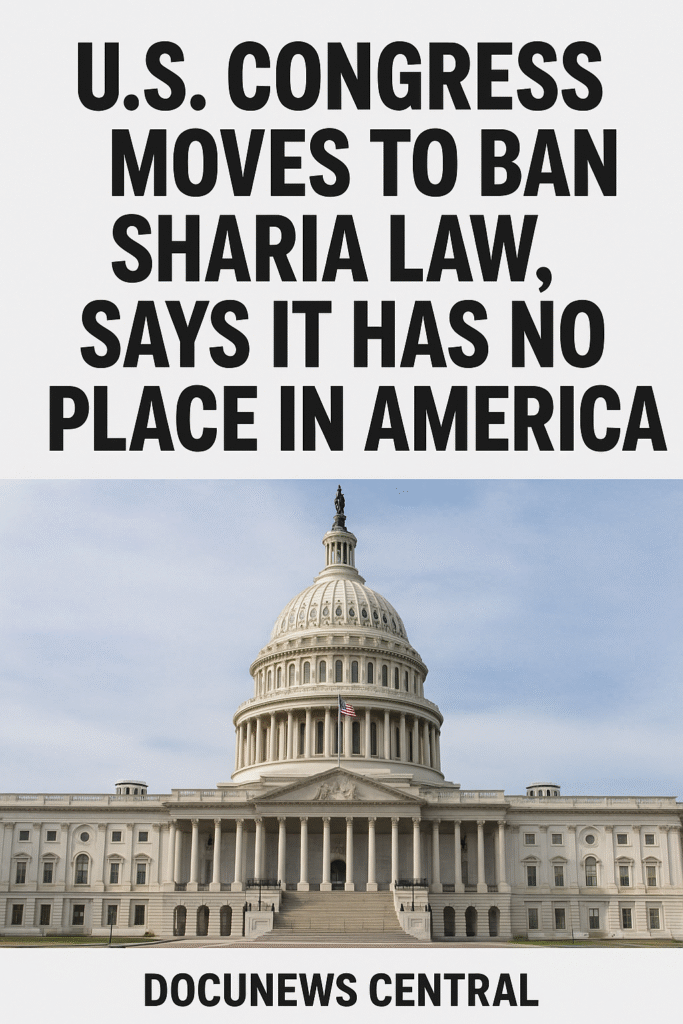

Introduction
The United States Congress has taken a bold step that has sparked intense national and global conversations. Lawmakers in Washington are now moving a fresh bill aimed at banning the use, enforcement, or recognition of Sharia law anywhere within the United States. According to the sponsors of the bill, Sharia law has “no place in America,” based on their argument that it clashes with the U.S. Constitution and the principles of the American legal system.
This new move has triggered reactions across political, religious, and social spaces. It also raises a deeper question being widely asked in Nigeria and other countries: If we borrow the U.S. system of government, why don’t we borrow the parts that bring order and stability too?
For many observers, the American action has brought new focus to Nigeria’s continuous debates about extremism, insecurity, religious intolerance, and the urgent need for stronger legal reforms.
Why Congress Says Sharia Law Has No Place in America
U.S. lawmakers say the motive for this bill is simple: the Constitution must remain supreme. In their view, any legal code or religious law that tries to act parallel to the Constitution poses a threat to national unity.
- The U.S. legal system is secular
- Religious laws cannot override constitutional principles
- Multiple systems of justice will create chaos
- Radical interpretations of Sharia law have caused harm in other regions
Congress members backing the bill insist that America must protect its legal identity. They say this action will guarantee that no group or individual can operate under a separate set of laws within the country.
For deeper background on constitutional supremacy, see our analysis on how U.S. governance works.
The Growing Concerns That Led to the Proposal
In recent years, America has witnessed intense debates about immigration, minority rights, religious freedom, and extremism. According to the sponsors of the bill, the rise of radical groups abroad and isolated cases of attempted Sharia-based arbitration in some American communities raised alarm.
Even though mainstream Muslims in the U.S. have repeatedly said they do not support extremist interpretations, lawmakers insist that prevention is better than cure.
This debate is similar to what Nigeria faces. Terror groups and extremist ideologies have led to countless tragedies, especially in the North. You can read more in our report on recent terrorism and security updates.
Nigeria and the Copying Question: What Are We Afraid Of?
Many Nigerians are already reacting to the U.S. bill with a mix of shock, interest, and admiration. For decades, Nigeria copied:
- The U.S. presidential system
- The U.S. Senate model
- The federal structure
- The separation of powers concept
But when it comes to protecting society through firm laws, the hesitation is obvious.
So Nigerians are now asking: If we copied their political structure, why don’t we copy their courage when it comes to banning things that cause chaos in our own country?
Nigeria has been battling:
- Violent extremism
- Sectarian killings
- Radical religious enforcement
- Parallel justice systems in some regions
To understand how U.S. federal decisions influence other nations, see our feature on the global impact of American policies.
The Debate on Human Rights and Religious Freedom
While many Americans support the Congress move, some organizations argue that the bill may spark new debates about religious freedom. Since Sharia law is religious in nature, some fear the bill may be misunderstood as a direct attack on Islam.
However, lawmakers claim the bill is not about religion but about protecting the uniformity of the legal system. They maintain that individuals can practice their faith freely as long as it does not interfere with civil law.
You can read more on similar global issues in our report on religious freedom debates.
What the U.S. Move Means for the Rest of the World
This bold congressional decision is likely to influence conversations in several countries. Nations struggling with extremism or radical groups may begin reviewing their own laws.
- Stronger constitutional protections
- Clearer separation between religious and civil law
- Tighter security laws
- Fresh debates about national identity
For countries like Nigeria, where extremism has destroyed entire communities, this bill may renew calls for more decisive action.
Could This Happen in Nigeria?
Many Nigerians believe that if America can take such a firm position, Nigeria should act even faster. Nigeria constantly claims it is “following America’s footsteps,” yet often imitates only what is convenient.
Adopting clearer legal boundaries may help Nigeria:
- Reduce extremist influence
- Strengthen national unity
- Prevent parallel justice systems
- Protect vulnerable communities
For a deeper dive on urgent national solutions, see Nigeria’s policy reforms that cannot wait.
Conclusion
The U.S. Congress move to ban Sharia law has created a powerful wave of reactions across the world. While some see it as a necessary step to protect America’s constitutional identity, others view it as a sensitive issue that requires careful communication.
However, one thing is clear: America is choosing clarity over confusion. The country wants one justice system, one constitution, and one legal identity.
For Nigerians watching from afar, this decision raises a simple but important question: If we borrow their political structure, why can’t we also borrow the parts that keep their society stable and organized?
As the debate continues, the world is watching how Congress will handle the final stages of this bill—and how other nations may respond.






